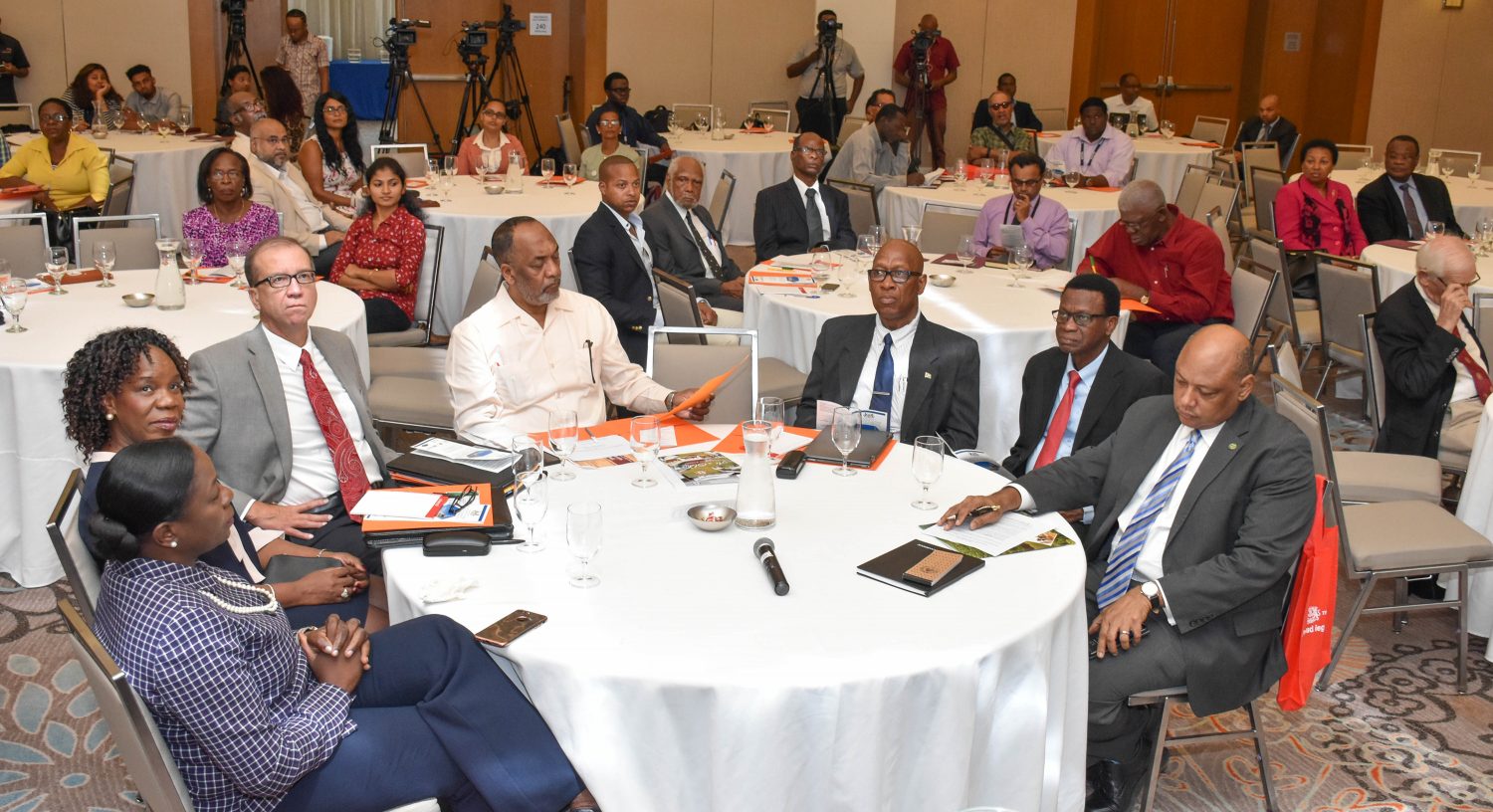The University of Guyana’s inaugural Oil and Gas stakeholders’ symposium yesterday heard Minister of Natural Resources Raphael Trotman call for the enhancing of critical skills that can be transferred to all sectors in the country and he also said that a national petroleum company will be set up.
By video conferencing, the forum also heard from UG’s Vice-Chancellor Pro-fessor Ivelaw Griffith that a system-wide review of the university has been commissioned to see which areas can benefit from the oil industry, which is expected to see first oil in 2020.
Under the theme “Identifying and meeting the demands for the engineering and operations management skills required in Guyana’s emerging oil-based industry and economy,” the first consultation between key players in the oil and gas industry and UG was held at the Marriott Hotel.
The aim of the gathering was to provide initial orientation for training institutions on the operations of the oil and gas companies’ operations in the country, to understand how to align better with activities and plans of the oil companies in Guyana, to understand and align with the priorities of the government in the sector, to begin to understand and to identify gaps in engineering skills with the objective of training to fill the voids and to build partnerships with the industry’s “movers and shakers.”
Giving the feature address, Trotman told the gathering, “…As you shift, think also of enhancing skills that are transferable to all sectors. For example, fabrication which can be utilized in mining and ship building. IT and Telecommunications, for example, could be applicable across a wide range of sectors. As well as welders, chefs, mechanics, logistics, marketing and business administration.”
He added that as the way is being cleared for the altering of the institutional charge for the sector, it must also be noted that despite the general public’s misconception, the oil and gas industry does not employ as many persons directly as people would believe.
“Taking a factoid from Trinidad [and Tobago], only about 4% of the population is directly engaged in the Oil and Gas sector, though we would believe that the entire nation in one way or another is directly involved,” he said, while emphasising that the industry here will generate revenue that can be made available to be used to expand and provide jobs in all sectors of the economy, which will indirectly benefit all of the citizens.
Trotman also stressed the need for there to be intensive focus on a health and safety culture, which will assist new and old businesses in competing on the international market. He said that while there is a high investment and high risk surrounding the international petroleum sector, businesses must maximise efficiency, while preserving safety and must not place all of their focus on attaining a skill.
Embracing these new values would advance the professionals and local businesses up to world-class standards, where they can compete internationally, Trotman said.
He added that he views the initiative by the university as another pillar that will be building on the firm foundation that the government wants to create.
“Here we can identify pressing needs as well as new capabilities that need to be developed or enhanced to help us close any existing gaps and ensure that all Guyanese have the opportunity to benefit from the sector directly and indirectly. Please recall that we (the Guyana Geology and Mines Commission) recently concluded the arrangement for [a] $100 million grant to the university for capacity building,” he added.
Policies
Trotman also used the forum to restate all of the policies and laws that are currently being drafted and consulted on. He highlighted that the Petroleum (Exploration and Production) Act is still being revised and “quite a bit” of progress has been made towards preparing it for public engagement and consultations within the first quarter of next year.
The Petroleum Commission of Guyana Bill is still before a Special Select Committee and has been going through a series of national consultations, while the Sovereign Wealth Fund Bill is still in draft form and is under review by the Ministry of Finance along with the Petroleum Taxation Bill and other fiscal legislation.
For the upcoming year, Trotman said that his ministry and the government by extension will intensify their focus on the establishment of a National Oil Company; a scientific institute, which is being supported by the Government of Mexico; and the long touted offshore logistics base.
“This new sector will provide increased revenue for the country whilst offering significant opportunities for the development of our businesses and talents. To say that it will be transformative will be to understate its impact,” he said.
Professor Griffith, who was unable to physically attend the event, also made a brief presentation through a video call. He said the symposium is an opportunity to not only gather input from the Faculty of Technology, but also an opportunity for a partnership to be built from all the other facets of the University.
“I want to encourage you to make full use and not only to listen but to contribute to help our university to fashion the kind of programmes to help our university to fashion the kind of partnerships that will benefit the industry and the nation and the University,” he said.
Griffith also said that he has commissioned a university-wide capability and needs assessment study on where there are opportunities in the oil and gas industry.
The symposium featured presentations from local and international representatives from the oil and gas industry, including Upstream Operations Manager of ExxonMobil Guyana Doug McGehee, who presented on ‘Activities, Plans and Limitations in Technical Human Resources.’
Attorney and oil and gas consultant Nigel Hughes also made a presentation on ‘Preparing in time for the incoming industry;’ Dr. David Alexander, from the University of Trinidad and Tobago, made a presentation on the ‘Skills and Jobs for Managing the Petroleum Industry or a National Oil Company,’ and Professor Andrew Jupiter, from the University of the West Indies, made a presentation on the ‘Oil and Gas Historical Perspectives and Lessons Learned in Trinidad and Tobago.’
The consultation was also attended by students of the University of Guyana.







